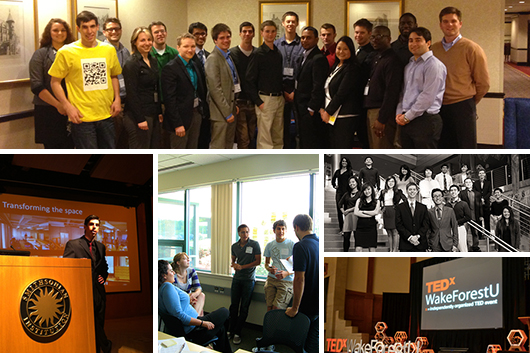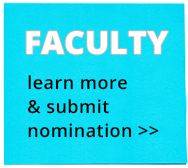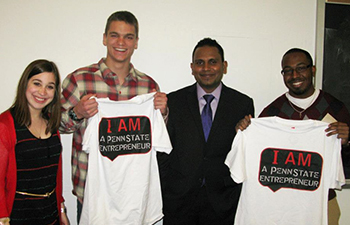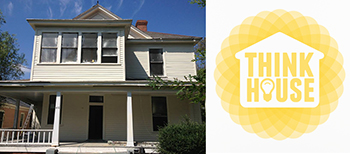Engineering students in the University Innovation Fellows program are driving a culture of entrepreneurship at their schools.

by Laurie Moore
In Spring 2013, a student in North Carolina hosted a TEDx Conference on her campus for 1,000 attendees. Another student in California turned an oversized junk closet on his campus into a collaborative prototyping space. In Kentucky, a student founded the first entrepreneurship club at his school.
These students are University Innovation Fellows, and they are leaders and drivers of change on their campuses. They observe the needs of their fellow students and respond to the demand for more activities and programs focused on entrepreneurship, innovation, venture creation, technology, design thinking and creativity.
The University Innovation Fellows program, hosted by the National Center for Engineering Pathways to Innovation (Epicenter), is empowering the next generation of student leaders to seize the opportunities for change that exist at their schools. The current 110 Fellows at 78 U.S. universities are part of a national movement to ensure that all students gain the attitudes, skills and knowledge required for them to compete in the economy of the future.
“Students can take ownership of the change they want to see on their campuses,” said Humera Fasihuddin, who directs the program for Epicenter. “It’s not enough for students to say, 'We wish there was this course at my school,' or 'We wish we could learn these skills.' "
Fasihuddin explained, "If students can organize and fill gaps and demonstrate their combined interest, they can make the change happen.”
The University Innovation Fellows program, recently featured on the White House OSTP blog, is an opportunity for undergraduate students in engineering and other fields in the United States. Fellows are nominated by their university faculty or deans, or they can apply for the program themselves.
 |
 |
Epicenter, funded by the National Science Foundation and directed by Stanford University and the National Collegiate Inventors and Innovators Alliance (NCIIA), empowers the Fellows by giving them access to mentors and resources, and connecting them with one another. This strong network of students, forged through the program’s in-person events and training, allows them to share experiences and gain insights into the ecosystems and challenges at other schools.
Fasihuddin, senior program officer for University Innovation Fellows at NCIIA, takes students through a six-week online group training. Each student learns to map their school’s entrepreneurial ecosystem, identify a work plan, recruit volunteers and kick off a series of activities designed to create lasting enhancements on their campus. As part of the Fall 2013 training, Fellows launched the online student entrepreneurship platform universityinnovation.org, which features resources, profiles of universities with entrepreneurship offerings, and guides to help students create opportunities on their campuses.The Fellows gather for in-person events in addition to their online training. Current Fellows and Fellow Candidates in training gathered in Silicon Valley March 20-22, 2014 to take part in workshops and activities at Google, Stanford University and NCIIA's Open 2014 Conference.
University Innovation Fellows Manifesto from Epicenter on Vimeo.
The impact the Fellows have on their campuses demonstrates the drive of these students as well as the need for more innovation and entrepreneurship programs. In the Fall 2012-Spring 2013 cohort, 37 students from 33 schools held more than 120 activities and events, reaching more than 9,000 people.
Here are just a few of the efforts that UI Fellows have launched on their campuses:
- John Oliver from Penn State University held the Ultimate Trader Challenge for eight weeks with 118 students, giving participants a single pen and challenging them trade over and over again for an item of greater value. The winner was able to trade up from the pen to a used Ford pick-up truck.
- Several Fellows hosted TEDx events at their schools, including Christina Oelsner with TEDxWakeForestU, as well as Invention to Venture (I2V) events, including Sharang Phadke of Cooper Union.
- Andrew Pennington founded the first entrepreneurship club at Eastern Kentucky University.
- Alexandra Halbeck from Tufts University co-founded the Tufts Venture Fund, a microfund by and for students and alumni.
- While they were students at Johns Hopkins, Nishant Kumar and Michelle Zwernemann launched an annual Shark Tank event for biomedical engineering students, which they modeled after the reality pitch TV show.
- Jared Karp from the University of California, Berkeley, turned an oversized junk closet into a collaborative prototyping space. Karp’s leadership was instrumental in securing a $20 million gift to create a design innovation center at UC Berkeley’s College of Engineering.

UI Fellow John Oliver (second from right) poses with several participants in Penn State's Ultimate Trader Challenge, which he organized in Spring 2013.
What sets UI Fellows apart from other entrepreneurial students is their ability to balance their entrepreneurial pursuits with their charge to make a positive impact on the ecosystems of their campuses. Their ambition to make a difference through innovation is evident in the ventures they’ve formed, the high-tech internships and research projects they’ve landed, and the relationships they continue to strengthen with one another and their national network.
BetaVersity is a startup led by three Fellows — Lucas Arzola, Blake Marggraff and Sean Newman Maroni — that installs maker spaces for universities and other clients. Inspired by their visit to Stanford’s d.school, the students now help institutions quickly ramp up innovation spaces with trained staff, students and volunteers. Within a month, they landed UC Davis as their first client, and have recently announced a second, ThinkHouse, a new residence for young entrepreneurs in Raleigh, North Carolina.
Maroni, continuing his work on creative spaces with BetaVersity, is working with ThinkHouse as the community developer. A senior engineering major at North Carolina State University, Maroni is helping transform a house in his community into a space for recent graduates to live and continue working on companies they created while in school. He said that his experience with the UIF program taught him the importance of creative, collaborative spaces and connected him with a sounding board of fellow students.

“The need for ThinkHouse has been reflected in conversations with people in the University Innovation Fellows,” he said. Creating a pipeline for students between the university and the workplace is a project that has resonated with the other Fellows, he said. “It’s a stark realization when you exit college and lose the same community you’ve had your whole life.”
Jack Goodwin, an aerospace engineering major at the University of California, San Diego, is currently interning for the Sierra Nevada Corporation. His work on a hybrid engine propulsion system is supporting the organization’s race against SpaceX and Boeing to build a commercial astronaut transportation shuttle to and from the international space station. He also had the recent opportunity to experience zero gravity himself aboard NASA’s reduced gravity aircraft nicknamed “the Vomit Comet,” where he and a team of student engineers from his school conducted experiments on biofuels as part of NASA’s Microgravity University Program.
“Aboard, we did a very accurate representation of how fast a biofuel ignites, expands and extinguishes without the effects of gravity,” Goodwin said. The applications of this include ground-based biofuel engines as well as space-safe liquid propellant fuel.
According to Goodwin, who also hosted a TEDx on his campus last year, conducting research while an airplane maneuvers on a parabolic flight path was a challenge. “At first, it feels like you’re on a roller coaster. Then, that feeling instantly goes away, and you’re floating,” he said. “Your arms and legs float out, and you have to learn 'how to walk' all over again using the walls of the plane.”
The UI Fellows themselves are learning how to move in new environments, discovering how to navigate their academic worlds both as the customers and the providers — as students and change-makers. They are exploring the many challenges and opportunities that exist in a campus ecosystem and connecting to students at their own schools as well as other universities.
“We help the students see the potential that exists and see themselves as agents of change,” Fasihuddin said. “They rise to that challenge.”
The University Innovation Fellows program is now accepting applications for the Fall cohort. Students can apply at dreamdesigndeliver.org/apply, while faculty and deans can nominate students at dreamdesigndeliver.org/apply/faculty.
The Spring 2014 deadline is February 10, 2014. Questions? Please email Humera Fasihuddin at humera [at] nciia.org.
University Innovation Fellows news
University Innovation Fellows Launch Online Entrepreneurship Platform
Advice from Student Entrepreneurs: "Be Fearless and Experiment"
Startup Culture Flourishes on America’s College Campuses
White House hosts "We the Geeks" Google hangout with Fellow Jared Karp


